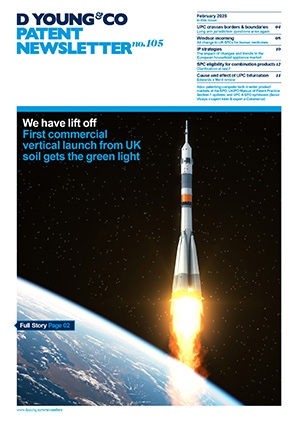Can an AI machine be named as an inventor on a patent application? Thaler v Comptroller General of Patents Trade Marks and Designs
On 02 March 2023, the UK Supreme Court heard the case of Thaler v Comptroller General of Patents Trade Marks and Designs, the latest in a series of cases related to whether an artificial intelligence (AI) machine can be named as an inventor on a patent application.
Background
The case concerns two patent application for inventions that the appellant, Dr Thaler, stated were created by an AI machine known as DABUS. The patent applications were taken to be withdrawn by the UKIPO for failure to correctly designate the inventor of the applications. Dr Thaler had indicated DABUS to be the inventor and that he had the right to grant of the patents by virtue of ownership of DABUS. This case is being heard at the Supreme Court after Dr Thaler’s appeal against the decision of the UKIPO was dismissed in the UK High Court and the Court of Appeal.
The issues considered by the Supreme Court are:
- Does section 13(2)(a) of the Patents Act 1977 require a person to be named as the inventor in all cases, including where the applicant believes the invention was created by an AI machine in the absence of a traditional human inventor?
- Does the Patents Act 1977 provide for the grant of a patent without a named human inventor?
- In the case of an invention made by an AI machine, is the owner, creator and user of that AI machine entitled to the grant of a patent for that invention?
Submissions
The appellants argued there is no requirement in the Patents Act 1977 for there to be a human inventor in order for a patent to be granted; section 13 is a procedural requirement and requires identification of the person/persons believed to be the inventor. Dr Thaler could not, in good faith, list himself as inventor despite being the owner and creator of DABUS. Since Dr Thaler does not believe a person to be the inventor, answering “no person” should be considered a complete and satisfactory response to this requirement; in the decision of the Court of Appeal, Lord Justice Birss agreed with this line of argument, but was in the minority.
The respondent argued the right to be named as inventor is a moral right and that a machine does not have such a right.
The purpose of the designation of the inventor is to list who the inventor is for the purposes of the Patents Act 1977 and that the right to a patent falls first with the person who derived the invention. Since the Patents Act 1977 requires a human to listed as the inventor, this requirement was not met. The respondent acknowledged that an invention need not be derived by a human, but maintained that “an invention for which a patent may be granted” must be derived by a human. This was the view of Lord Justice Arnold and Lady Justice Laing in the Decision of the Court of Appeal, Lord Justice Arnold noting that the statutory requirements are that (1) the inventor must be a person and (2) an applicant who is not the inventor must be able, at least in principle, to found an entitlement to apply for a patent in respect of the invention.
The respondent noted that the accuracy of the designation of inventor is not investigated by the comptroller, and that if Dr Thaler had listed himself as the inventor then the patents would have granted; the fact that DABUS was used to devise the invention could be set out in the description. The respondent also referred by analogy to the Copyright, Designs and Patents Act 1988, where the author for computer-generated works is the person who made the arrangements necessary for its creation. The appellants argued that it would be inappropriate to list Dr Thaler as the inventor since he is simply the creator of DABUS and that this act is sufficiently far removed from the inventive activity to not justify him being named as inventor.
Discussion
In view of the questions raised by the Lords during the hearing, it is expected that the answer to the first two questions will be yes; a person is required to be named as the inventor in all cases and a patent cannot be granted without a named human inventor.
This would be in line with the majority view of other jurisdictions worldwide; the patent applications in question have been filed in 18 different jurisdictions and only granted to date in South Africa. The cases are also under appeal to the Supreme Court in Germany and the US, but the applications have been denied by the Federal Court of Australia, refused by the Board of Appeal at the EPO and, most recently, refused by the High Court of New Zealand on 17 March 2023. Such a harmonised view that an AI machine cannot be named as an inventor avoids potential difficulties in claiming priority from applications in countries which have different rules regarding AIs as inventor
The comptroller appears to have acknowledged that the creator of an AI machine is entitled to the grant of a patent for an invention created by that machine on condition the creator lists themselves as the inventor.
This would be consistent with the computer generated works provision of the Copyright, Designs and Patents Act 1988 and would still incentivise the development of AI in the UK, which was one of the main concerns of the appellant.
Note however that the present case is a simple situation where the owner and creator of DABUS is the same person. In more complex situations, for example where the AI software was generated by a team of people and the invention was created whilst the machine operating the AI software was owned and operated by a different company, a chain of assignments or contracts would be required in order to demonstrate the operating company’s right to apply for a patent.
There is a pending divisional application at the EPO where the Examining Division has objected to the designation of Dr Thaler as inventor “by virtue of owning the AI system that created the invention” for not clearly and unambiguously designating the inventor. The description of the divisional application has also been amended to refer to Dr Thaler as the “deemed inventor”, which the Examining Division considers to cast further doubt as to the true inventor for the application. Whilst, like the UK IPO, the EPO does not investigate the accuracy of the designation of inventor, it does still require the person(s) who is the inventor to be identified. In their decision on the parent application (J 0008/20), the Board of Appeal stated it was not aware of any case law which would prevent the user or owner of an AI machine from designating themselves as inventor. The ambiguity in this instance is created due to Dr Thaler’s repeated reference to DABUS as the inventor, rather than DABUS being a means used to derive the invention, stemming from Dr Thaler’s belief that he is not the true inventor. Unless Dr Thaler’s view changes, this divisional application also appears likely to be refused.
Other developments
The role of AI is currently at the forefront of government policy. In the last month, Viscount Camrose was appointed Parliamentary Under Secretary of State in the Department for Science, Innovation and Technology and Minister for AI and Intellectual Property. In the 2023 Spring Budget, Chancellor Jeremy Hunt announced a collaboration with the UKIPO to “provide clarity on IP rules so generative AI companies can access the material they need” following recommendations from Sir Patrick Vallance’s review on pro-innovation regulation for digital technologies.
The comptroller also acknowledges that the role of AI will increase, but considers that a holistic approach with representation and evidence from all stakeholders is required. If changes are necessary, the comptroller believes it is for parliament to evaluate and make if necessary, not by the Supreme Court in an isolated case. As acknowledged in the government response to the recent consultation on AI and IP, discussions and any changes on AI inventorship need to be made in an international context. It therefore seems unlikely that the pending Supreme Court decision, which is expected to be handed down later this year, will differ from the decisions of the lower courts.
Case details at a glance
Jurisdiction: England & Wales
Decision level: Court of Appeal
Citation: [2021] EWCA Civ 1374
Date: 21 September 2021
Useful links
- [2021] EWCA 1374: dycip.com/thalervcomptroller
- J 0008/20 (designation of inventor/DABUS) of 21.12.2021: dycip.com/j820-boa-dabus

